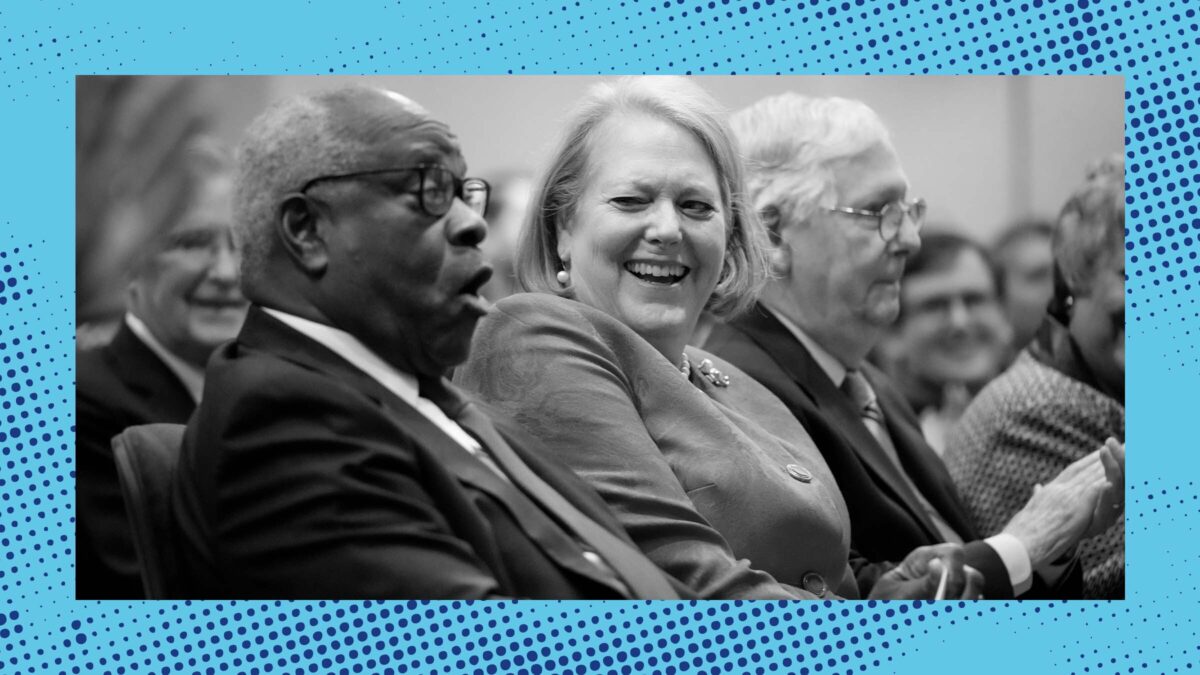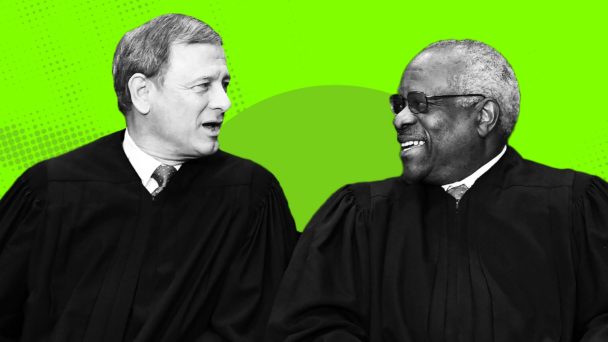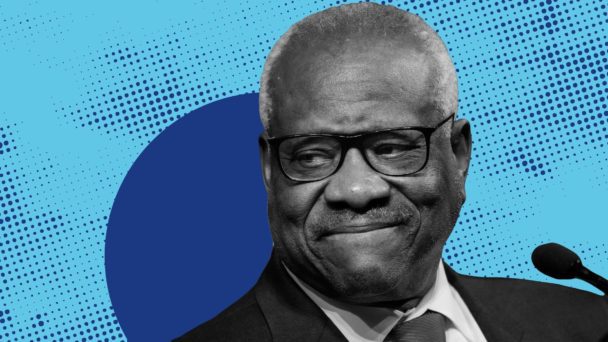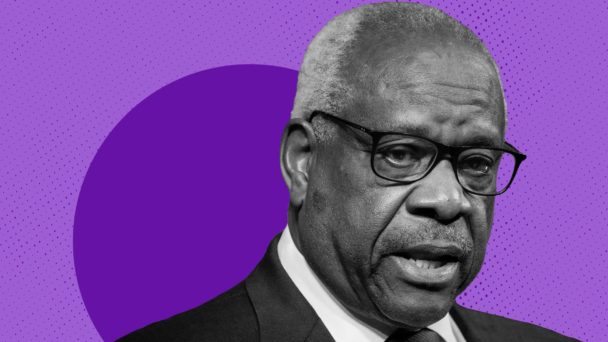If you are a Supreme Court reporter with a book deal, it is impossible to introduce the character of Clarence Thomas without including a few soft-focus anecdotes about the justice’s perhaps-surprising appreciation for the simple life. He and his wife, Ginni, speak frequently and fondly about their summers spent criss-crossing the country in a 40-foot RV, which, they are careful to note, they bought used in 1999. On the road, they split their nights between Wal-Mart parking lots and, when available, campgrounds that honor one of their senior citizen discount cards. “It’s a wonderful life,” Ginni told NPR in 2009.
Since his confirmation in 1991, Clarence Thomas has made the everyman shtick an integral part of his public image—a Supreme Court justice who proudly eschews the D.C. social scene to, in his words, spend time with “regular folks” and see “the best of America,” or “real America,” or “the part we fly over.” He and Ginni are regulars at Nebraska Cornhuskers football games (Ginni’s an alum), and have hinted that they might retire to Lincoln if and when he steps down from the bench. In 2004, the RV Industry Association presented Thomas with its annual Spirit of America Award, recognizing him as an “exemplary representative of the traditional American values inherent to RV travel and camping.”
“I come from regular stock, and I prefer that,” Thomas explained in a 2020 documentary. “I prefer being around that.”
Another key component of this narrative: Thomas’s enduring passion for NASCAR, which culminated in 1999 when he was honored as Grand Marshal of that year’s Daytona 500. (This role entails delivering the ceremonial “GENTLEMEN, START YOUR ENGINES” line before the race begins, a task for which Thomas, who speaks in a gravelly bass, is admittedly well-suited.) Here is a photo of Thomas, clad in a novelty leather jacket, chopping it up with the then-defending Daytona 500 champion, the late Dale Earnhardt. I have never seen a real photograph that looks more like an AI-generated image in my life.
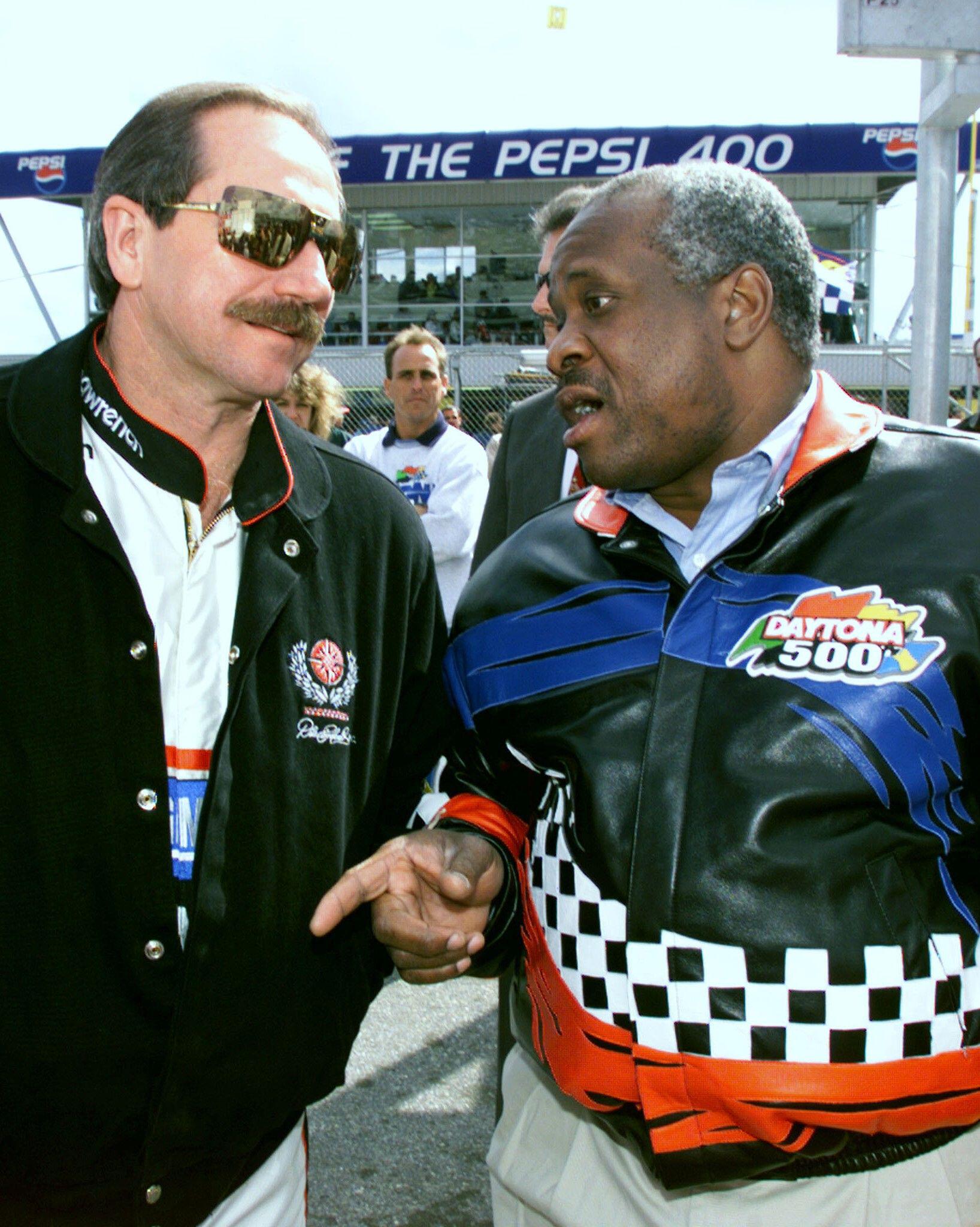
Contemporaneous media coverage focused on the significance of a high-profile Black man presiding over a marquee event of a sport that has long struggled to make inroads with Black fans. NASCAR’s deep roots in the South mean that its history is riddled with problematic cameos: George Wallace, who carried five states as a pro-segregation presidential candidate in 1968, served as the Daytona 500’s Grand Marshal in 1976. For years, winners at the Darlington Raceway in South Carolina had the privilege of taking a victory lap with the raceway’s mascot, a guy wearing a novelty Confederate soldier uniform, sitting on the hood. Confederate flags were fixtures at tracks until 2020, when NASCAR banned them after Bubba Wallace, then NASCAR’s lone Black driver, called on the organization to do so. The Sons of Confederate Veterans quickly registered their displeasure by flying a small plane over Talladega with a stars-and-bars banner that read, “DEFUND NASCAR.”
As you might expect, reactions to Thomas’s appearance at Daytona some twenty years before all this were, to say the least, mixed. A handful of Black NASCAR fans sounded cautiously optimistic: “I’ve been here when presidents, heads of state and local officials started the race,” Leroy Dennis told the Orlando Sentinel in 1999. “I’ve never been here when a Black person started the race. I think it’s a step ahead for NASCAR.”
For an alternative viewpoint, the Sentinel spoke to one Zack Berndgen, a Daytona attendee whose tent was festooned with a Confederate flag and a sign offering beer to women who would flash him. “I don’t want to have any [racial slur] out here,” Berndgen said, to a reporter, for a newspaper. “We’ve got affirmative action, desegregation and all that other crap being shoved down our throats, and this is the only place where we can get away from that. NASCAR was born white, and it should stay white.” If this was the Sentinel’s most printable quote opposing Thomas’s involvement, I shudder to imagine what didn’t make the story’s final edit.
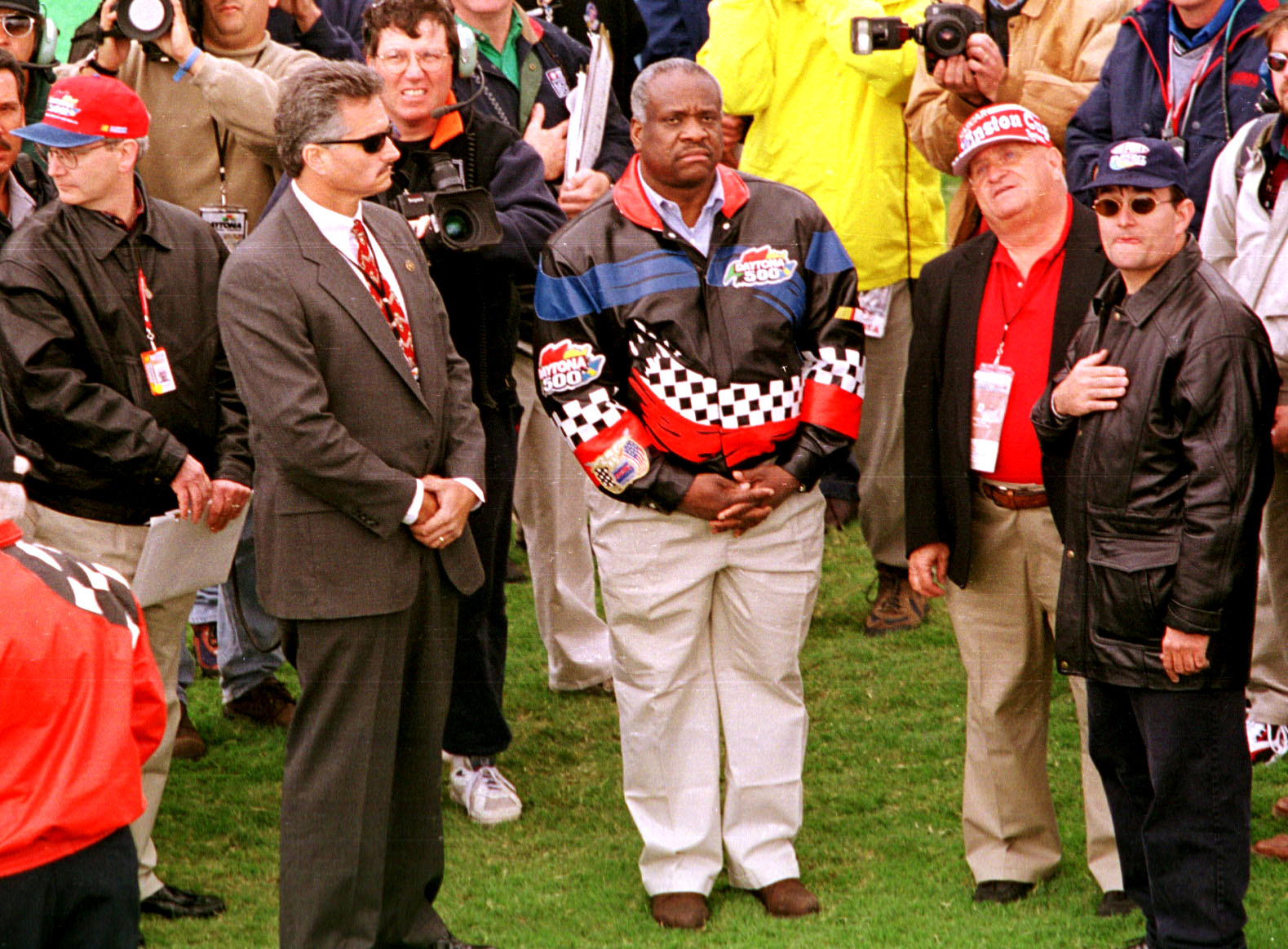
NASCAR execs, perhaps nervous about how the slur enthusiast segment of their fanbase would react, tried to walk a hilariously thin line in public, celebrating Thomas’s participation while ignoring its cultural significance. NASCAR’s president, Bill France Jr., emphasized the primacy of Thomas’s stock car fandom in his selection as Grand Marshal, and insisted that there was “no race factor involved one way or the other.”
Others linked to the event were more skeptical, citing some combination of Thomas’s status as a credibly-accused sexual harasser and his then-still-emerging reputation as the Court’s resident right-wing freak. Longtime sports announcer Greg Gumbel, who is Black, called that year’s Daytona 500 for CBS but declined to attend the pre-race gala honoring Thomas, explaining that it would be “hypocritical” for him to attend in light of the justice’s record. Even some Winston Cup drivers weren’t quite sure what to make of the presence in a mostly-white sport of a powerful Black politician who was mostly famous for being a reactionary sex pest. “What’s the message they’re trying to send?” asked one driver, who asked the Sentinel not to identify him “because of possible retribution.”
Thomas, for his part, told reporters that it would be “wonderful” to have more Black people involved with the sport. For the most part, however, he seemed to revel in the fan experience: In a 2021 law review article, an ex-Thomas clerk recalled her boss crawling under cars and “peppering the drivers with questions about their pit crews.” At work the following Monday, he apparently wore his jacket to the justices’ private conference, and reported “with great amusement” that his colleagues “did not fully appreciate it.” In a fun quirk of history, among the VIPs with whom Thomas hung out that afternoon was the man whose coup attempt Thomas’s wife would one day express her enthusiastic, randomly-capitalized support.
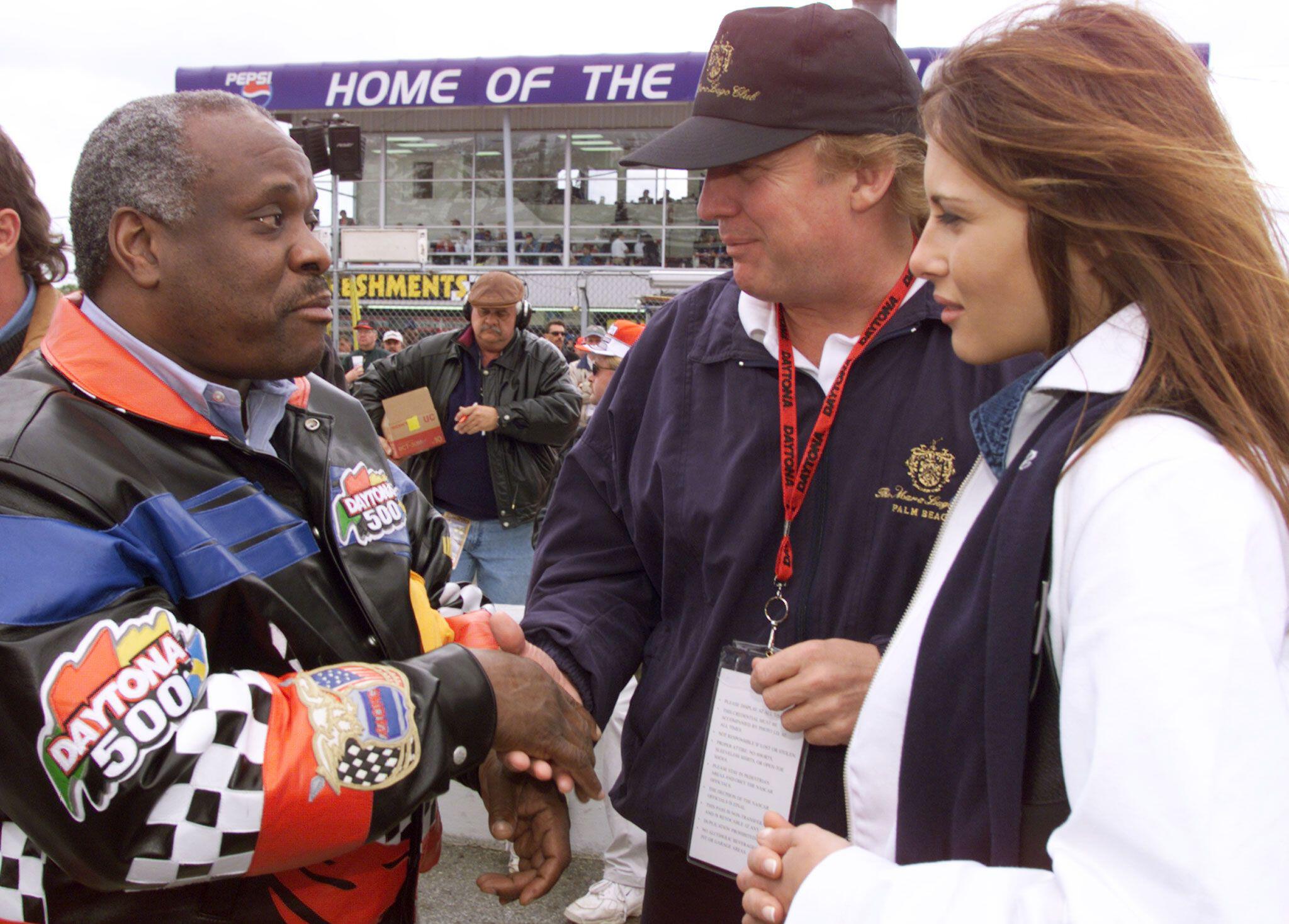
Recent revelations about Thomas’s enjoyment of the finer things the Federalist Society social circuit has to offer cast a different light on his alleged admiration for well-choreographed pit stops. Per ProPublica, the justice has long enjoyed regular lavish vacations, replete with private planes and stays at invitation-only resorts, courtesy of real estate magnate Harlan Crow, who also helped finance that 2020 documentary, Created Equal: Clarence Thomas In His Own Words. Crow’s largesse is not limited to travel expenses or vanity film projects; he also bought Thomas’s childhood home in 2014, where Thomas’s mother continues to live rent-free. If Clarence Thomas loves NASCAR as much as he claims, he’s one of its few fans with the option of watching a race on TV from a suite in a billionaire’s superyacht.
It’s easy to point out the hypocrisy of this everyman act. But it’s also easy to understand why Thomas puts it on in the first place: The most formidable challenge that accompanies the GOP’s embrace of right-wing populism is that the things politicians actually need (corporate benefactors, well-connected and cartoonishly wealthy friends) do not appeal to the target audience. Succeeding in the conservative movement thus requires finding ways to disguise the true sources of one’s success, and the identities of the tiny handful of the reactionary goblins who benefit from it. What Thomas understands, however, is that this doesn’t require you to actually renounce the perks of being a person who knows people who own superyachts. You just have to cast yourself as a salt-of-the-earth type who would never think to take advantage of those perks in the first place.
I have no idea if Thomas “actually” likes RV parks, Wal-Mart parking lots, or Talladega campgrounds. But it also doesn’t matter, because curating a brand associated with this stuff fulfills the same purpose as, say, wealthy TV personality Donald Trump’s love for big-boy trucks, or boarding school dipshit Tucker Carlson’s rustic outdoorsman cosplay, or any Ivy League-educated Republican lawmaker’s Pavlovian tirades about the unchecked power of “coastal elites.” As a Supreme Court justice, Clarence Thomas’s job is to make his richest, most powerful friends even richer and a lot more powerful. His bet is that by pulling on a souvenir NASCAR jacket and making a big fuss about touring “real America” every summer, the people his work is hurting won’t notice.
